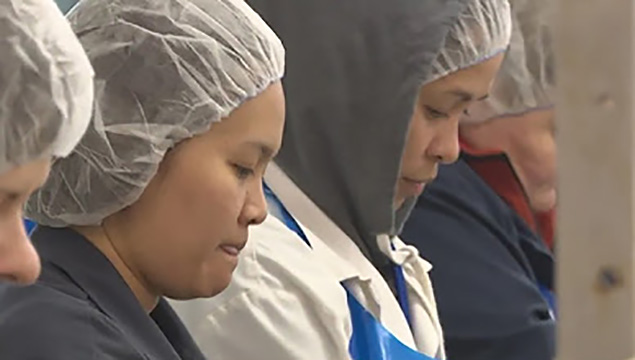Last month, when the federal government flirted briefly with barring temporary foreign workers from coming to Canada as part of the fight against COVID-19, it sent shockwaves through the country’s agriculture and fishing industries.
Under the Seasonal Agricultural Worker Program, some 60,000 people–mainly from Mexico and Caribbean countries–come to Canada every year to work on farms and at meat and fish processing plants.
Barring them, critics of the plan said, would set both industries back, leading, some predicted, to collapse.
The government relented with the proviso that that arriving workers would be required to quarantine for 14 days to fight the spread of the virus. With employers picking up the cost.
On Monday, Agriculture Minister Marie-Claude Bibeau announced $50 million in federal funding to offset those costs.
Bibeau said Ottawa will provide $1,500 per worker.

Temporary foreign workers, such as these Filipino workers at the Tignish Fisheries processing plant in P.E.I, and seasonal agricultural workers, many from Mexico, Guatemala, and the Caribbean, are critical to Canada’s food production.(CBC)
The money, she said, can be used to cover wages while the workers are in quarantine or the costs of space to isolate for the 14 days.
Entering workers are expected to be screened for symptoms before they leave their home countries, but that is meeting opposition from the Conservatives and the Bloc Quebecois, both of whom want the workers fully tested for COVID-19.
Whether or not the agricultural and fishing industries get the workers they need this year remains problematic, according to The Canadian Press’s Stephanie Levitz
Ken Forth, the president of Foreign Agricultural Resource Management Services, which assists farms and other related companies to bring in foreign labour, told Levitz that a chronic labour shortage is being “exacerbated by global travel restrictions” brought on by the COVID-19 pandemic.
Currently, about 15,000 jobs remain vacant.
Funding announced Monday applies only to workers arriving after the mandatory quarantine was put in place.
It will only be available as long as the requirement exists.
Several thousand workers, already in Canada for the farming season, are currently in quarantine or just emerging from it.
With files from CBC News (Kathleen Harris), The Canadian Press (Stephanie Levitz), RCI (Marc Montgomery)







For reasons beyond our control, and for an undetermined period of time, our comment section is now closed. However, our social networks remain open to your contributions.